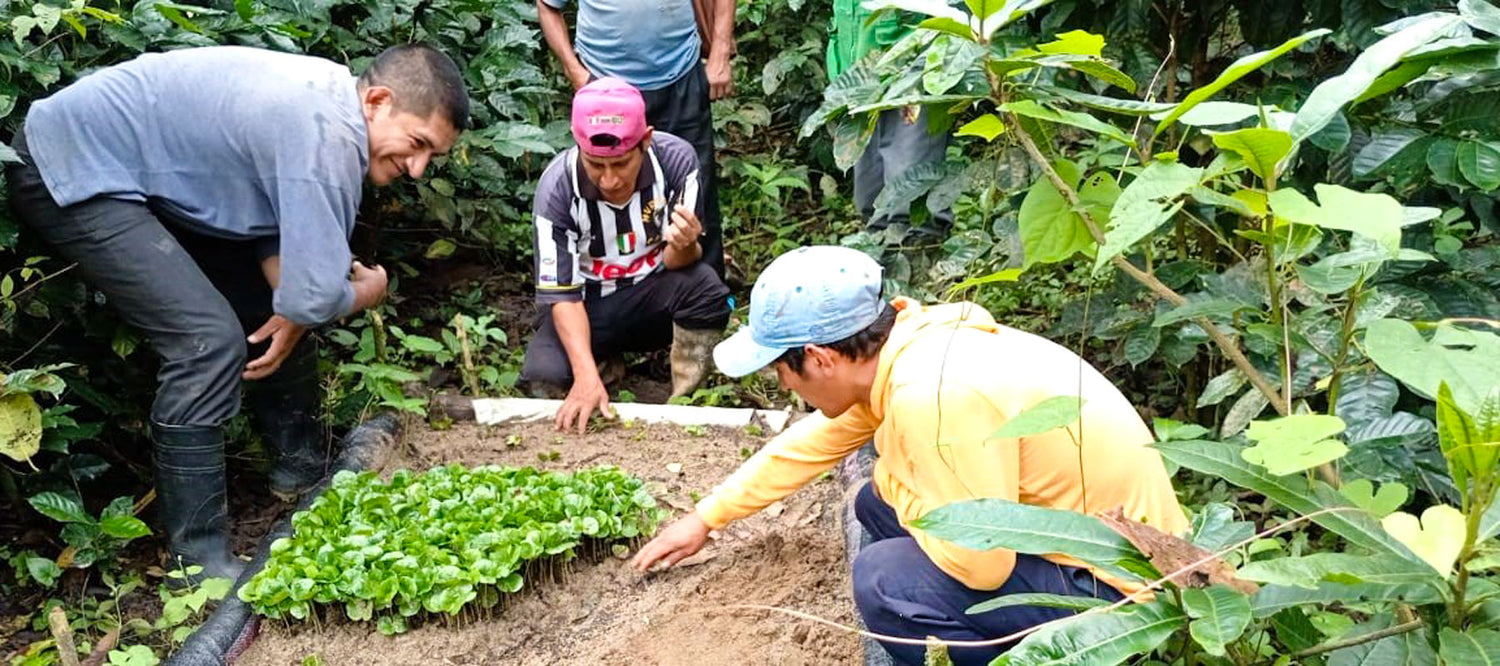Planting seeds of hope.
-
At 23 Degrees Coffee Roasters, we take pride in supporting our farmers and their communities. This year, we launched an ambitious project to replant coffee trees, shade trees and irrigation systems in Caracha, a community located in the district of Penachi, which is part of the province of Salas in the Lambayeque region of northern Peru. This initiative, part of our broader commitment to sustainability and community support, aims to restore the coffee eco system severely damaged by Cyclone Yaku and the intense El Niño rains.
The Cyclone’s Aftermath and the Path to Recovery
Cyclone Yaku, alongside the heavy seasonal rains reminiscent of the devastating El Niño phenomena of 1982, 1983, and 2017, inflicted unprecedented damage on the Caracha community. Mudslides, floods, and landslides disrupted lives and livelihoods, particularly affecting small coffee producers who rely heavily on their crops. The destruction of coffee farms and irrigation systems threatened the stability of the community, prompting a critical need for intervention.
Our project focuses on replanting coffee trees and rehabilitating the irrigation infrastructure. By providing seeds, coffee seedlings, shade trees, and essential irrigation equipment like hoses and pipes, we aim to restore the productivity and sustainability of 25 families’ coffee farms. This initiative seeks to recoup lost investments and deter rural-to-urban migration by providing farmers with a reliable source of income.
-
Here's What We've Achieved Together So Far:
- Seed Distribution: We have facilitated the sourcing and placement of 2.5 kilos of Marsellesa and Bourbon coffee seeds from organically certified Café Femenino plots, ensuring the organic certification of Café Femenino coffee.
- Nursery beds: Farmers have prepared two nursery beds.
- Nursery Care: Over the last six months, the dedicated coffee farmers of Caracha have nurtured these seeds into 12,500 healthy seedlings in the nursery plots, providing the necessary care and nutrients to develop strong roots and stems.
- Land Preparation: The land damaged by Cyclone Yaku has been thoroughly cleared and is ready to house the young coffee plants.
The Next Stage: Transplanting Seedlings.
The next exciting phase of our project is to transfer these healthy seedlings, now young coffee plants, mature enough to their new ‘homes’. This crucial step will ensure that the coffee plants are firmly established in their new environment and ready to grow and flourish over the coming months. It will take another three years for the first coffee to be harvested, and we can’t wait to taste it.
Together we nurtured 12,500 coffee seedlings
Thanks to our local partner, the Cafe Femenino Foundation we received these amazing updates on the progress of the building of the water reservoir. We were humbled and blown away by the hands-on approach of the local community and how it all came together. Look at this challenging terrain.
The Promise of Marsellesa and Bourbon Varieties
The Marsellesa and Bourbon coffee varieties hold significant promise for the future of coffee farming in Caracha. Known for their high cup quality, these varieties have performed excellently in the Villarrumi test plots, where new agricultural techniques and crop varieties are showcased. Their introduction to Caracha is expected to yield similar results, provided harvest and post-harvest management are meticulously handled.
Addressing Challenges in Peruvian Coffee Production
Peruvian coffee farmers face numerous challenges, including droughts, the coffee borer beetle, and leaf rust. These issues threaten not only crop yields but also the livelihoods of countless small-scale farmers.
- Droughts: With climate change intensifying weather patterns, droughts have become more frequent and severe. The new coffee varietals are more resilient to these conditions, ensuring better survival rates and yields even in dry seasons.
- Coffee Borer Beetle: This pest can devastate coffee crops by burrowing into the beans, rendering them unsellable. Marsellesa and Bourbon varieties have shown increased resistance to this pest, reducing crop losses and improving quality.
- Leaf Rust: This fungal disease has plagued coffee farms worldwide, causing significant yield reductions. Introducing these resistant varietals provides a sustainable solution to combat leaf rust, safeguarding the health and productivity of coffee plants.
The Café Femenino Foundation
Integral to our mission is our partnership with the Café Femenino Foundation, a groundbreaking organisation dedicated to empowering women in the coffee industry. The foundation supports female coffee farmers through various education, healthcare, and leadership training programs. By funding projects like the replanting initiative in Caracha, the Café Femenino Foundation ensures that women coffee farmers receive the resources and support they need to thrive. This not only enhances the quality of their coffee but also promotes gender equity and strengthens entire communities.
A Brighter Future for Caracha’s Coffee Farmers
The coffee producers in Caracha are incredibly enthusiastic about the prospect of renewing old and damaged plantations and about the performance of the Marsellesa and Bourbon varieties. Our ongoing support for technical management and training in germination and bagging processes is expected to lead to a successful transplantation phase, especially with favourable weather conditions.
At 23 Degrees Coffee Roasters, we are fully dedicated to ensuring our coffee farming communities’ long-term success and sustainability. This replanting project is not solely about revitalising crops; it’s about reinstating hope, stability, and a prosperous future for Caracha’s coffee farmers. Together, we are sowing the seeds for a resilient and thriving coffee ecosystem.








